CSotD: The difference between ignorance & apathy
Skip to comments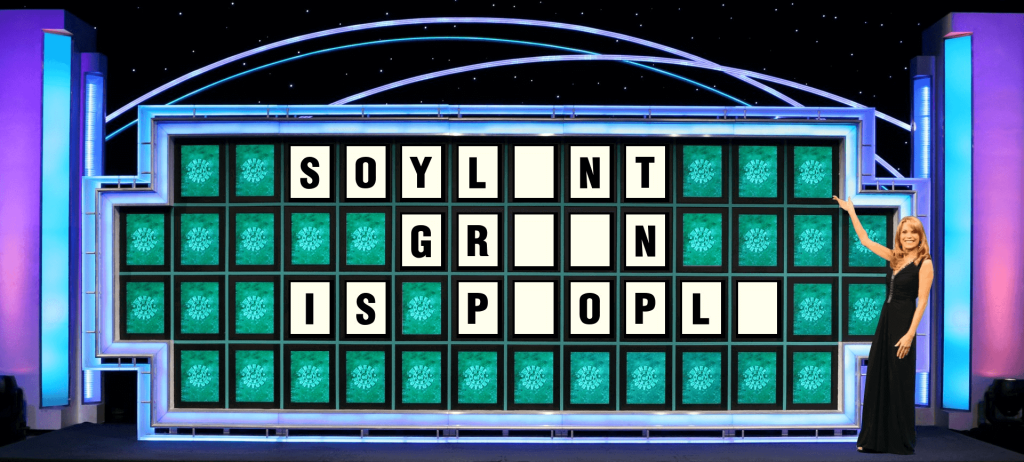
An obvious but timely meme, to which I’ll add an old but timely joke:
“What is the difference between ignorance and apathy?”
“I don’t know and I don’t care.“
In Amusing Ourselves To Death, Neil Postman argued that the model for our dystopia was not Orwell’s “1984” but Huxley’s “Brave New World,” because we were not being repressed by a harsh government but being distracted and mollified by addictive, content-lite media.
It’s a very old book: Postman wrote it in 1984 as a response to the date and the book of that title, which means he based it on a long-ago world of limited cable offerings and no visible Internet.
Obviously, the world he described has not become any less prone to vacuous amusement since.
I agree with Postman, and I’ve also argued that “Animal Farm” is more pertinent than “1984,” because the animals are so easily led and prone to accepting authority even when it contradicts itself and acts in the interests of a ruling elite who only pretend to represent the commoners they profit from.
I’d add that our access to the Internet makes us even more like the pathetic wife in “Fahrenheit 451” who spends her days blissed out on interactive soap operas she thinks are genuinely directed at her.
And, as suggested in the meme above, we can’t recognize warnings even when they are all but spelled out for us.
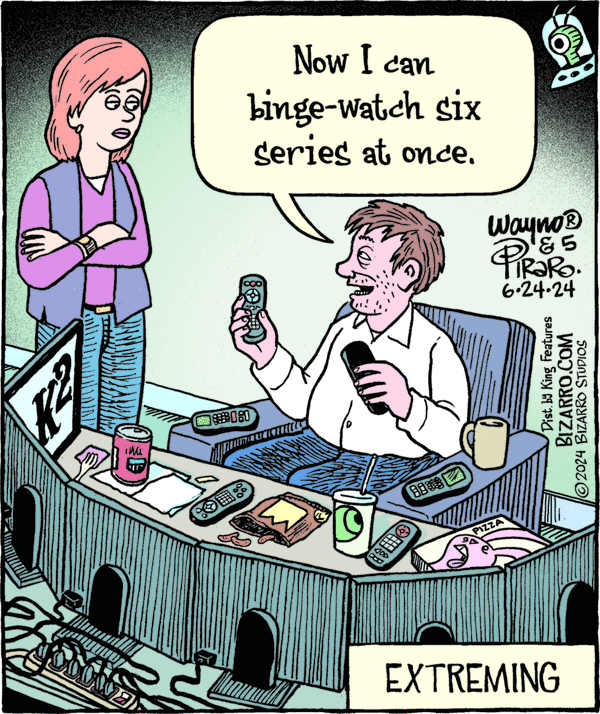
Today’s Bizarro (KFS) is sadly close to the truth. It may be that bingeing TV shows became a thing during the Covid lockdown, but well before that, critics were raving about a “new Golden Age of Television” which apparently meant more elaborate settings and better special effects.
It certainly didn’t mean the return of Paddy Chayefsky, Rod Serling and gang.

Amorim (Cartoon Movement) shouldn’t blame the Euro Cup (or the somewhat parallel Copa América) for keeping anyone from also keeping up with the wars in Ukraine and Gaza or the upcoming elections in various countries, even in countries more obsessed with futbol than we are.
Unless people want a distraction, which they do.
Though Postman would argue that the way news is presented on television is in itself a playful distraction rather than an immersive, educational experience.
The games aren’t likely intended as a deliberate distraction from politics, but they’re one more way we can avoid paying attention.
Besides, there are plenty of people normalizing, if not intentionally encouraging, voter ignorance and apathy, as seen in this
Juxtaposition of the Day

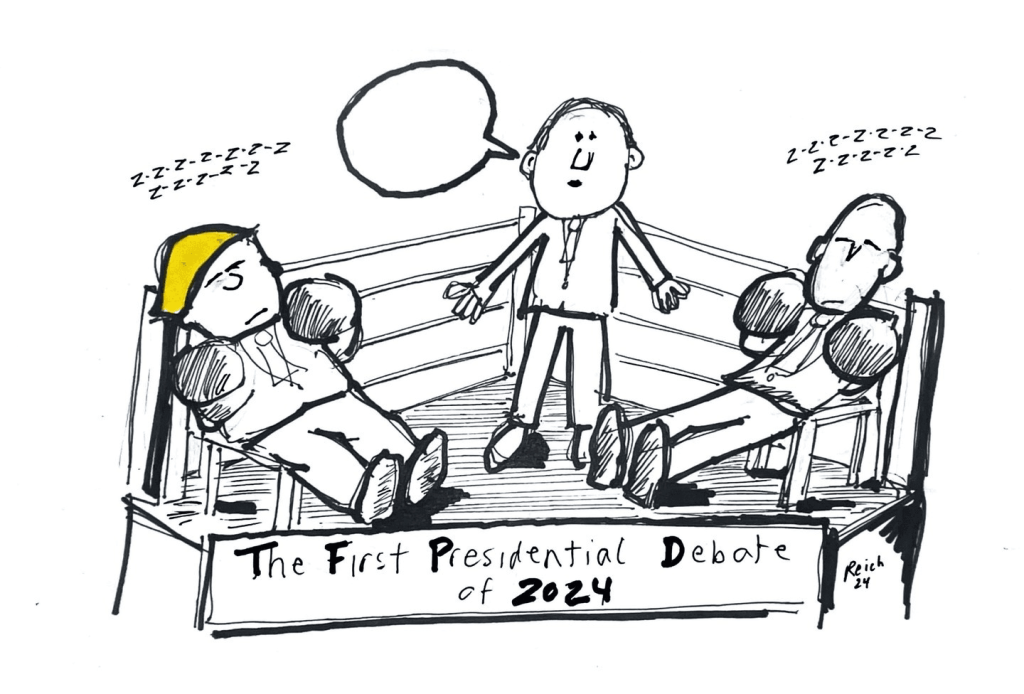
Darkow may be commenting on voter apathy as we lead up to Thursday’s debate, but Reich, who is less a cartoonist than a lecturer who illustrates his points with doodles, is declaring the event as literally a snoozefest.
It’s utterly out of character for Reich, who has been a Cassandra warning against both political and economic threats, and it’s hard to find a motivation for Darkow to want to discourage people from becoming engaged.
They may both have intended, rather, to express despair over apathy.
But one of the things satirists learn early on, if they learn it at all, is that things you present as warnings and in the spirit of reverse psychology are often taken at face value by a disturbing proportion of the people who least need help in missing the point.
The people who, faced with the Wheel of Fortune puzzle above, would ask to buy the wrong vowel, or perhaps would just guess a random consonant.
And they vote.
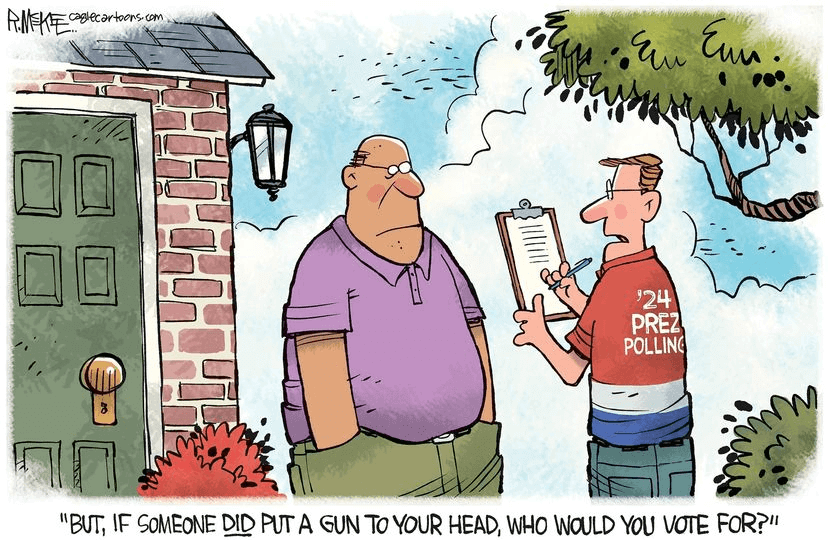
Though they may vote reluctantly, and here Rick McKee may be making a point about voter apathy, or he may be decrying the choices we’re being offered.
But I would insist that the net effect for a great many readers is to normalize apathy, to tell them it’s okay to be unhappy with the choices and that it’s reasonable to just sit back and let whatever is going to happen happen.
Which might make sense if the President of the United States were more of a titular figure who made happy-talk speeches, threw out the first baseball each spring and maybe cut the ribbon at a new shopping center from time to time.
But if cartoonists, instead, would focus on getting people to turn off their reruns of Young Sheldon and pay attention, rather, to Project 2025, a sense of apathy and a sense that “they’re all alike” might disappear like a morning fog.
“Comforting the afflicted” does not mean tucking them into bed with milk and cookies. It means encouraging them to help preserve their best interests while letting them know they are not alone in feeling out of control.
And that they are not out of control unless they decide they’d rather be.

Tank McNamara (AMS) is mocking sports coverage, but having attended my share of press conferences, I can assure you that trite questions are normal everywhere, and worse are reporters who enter the room knowing what they intend to write and are only looking for quotes to flesh it out.
It’s relatively harmless when those quotes are needed to confirm a writer’s pre-formed opinion about a play in the third quarter. Less so when they’re sought to confirm the writer’s pre-formed opinion about inflation or the war in Gaza.

David Horsey gets that final category right. Anyone with the vaguest notion of how tariffs financed this nation in the 19th Century realizes the level of delusional bat guano in this ridiculous proposal, and anyone covering the economy who doesn’t know how our system of tariffs harmed our own people in those days should not be assigned to political coverage.
Those links lead to some heavy reading, but that’s why I don’t believe people should major in journalism. Learn all about something you genuinely care about, then get a j-degree as a masters, so you can get a job writing knowledgeably about it.
After all, would you hire a baseball writer who didn’t know what RBI stands for and who wasn’t familiar with the infield fly rule? Why assign economics to a reporter who hasn’t studied economics?
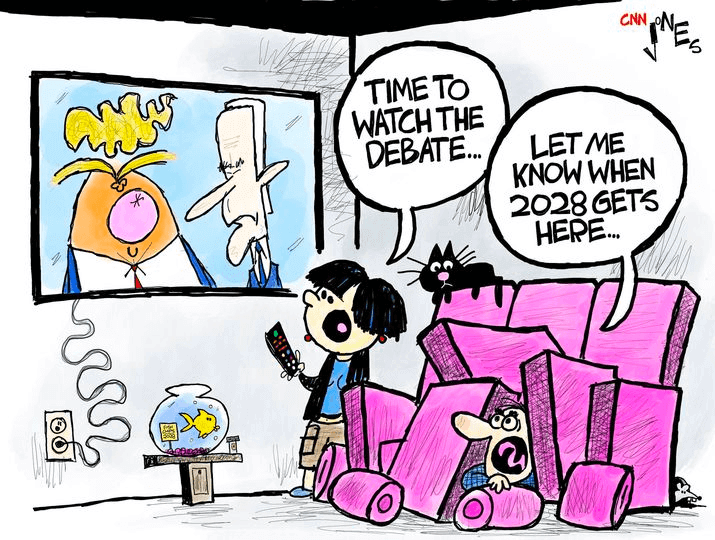
And if the idiot in this Clay Jones cartoon thinks he’ll get a second chance to give a damn in 2028, he has no idea what we’ll be voting about this November.


Comments 4
Comments are closed.